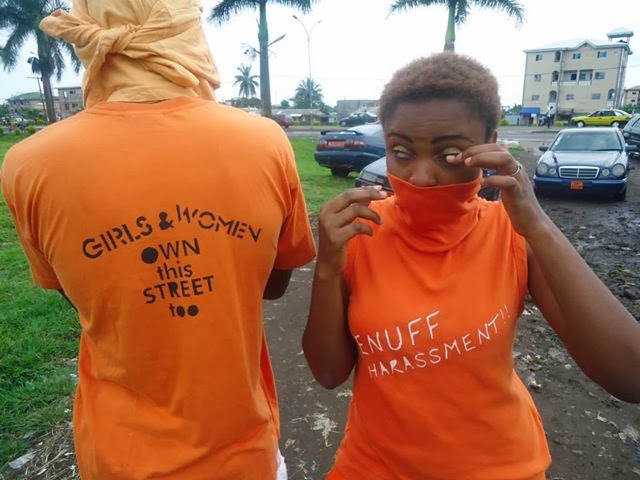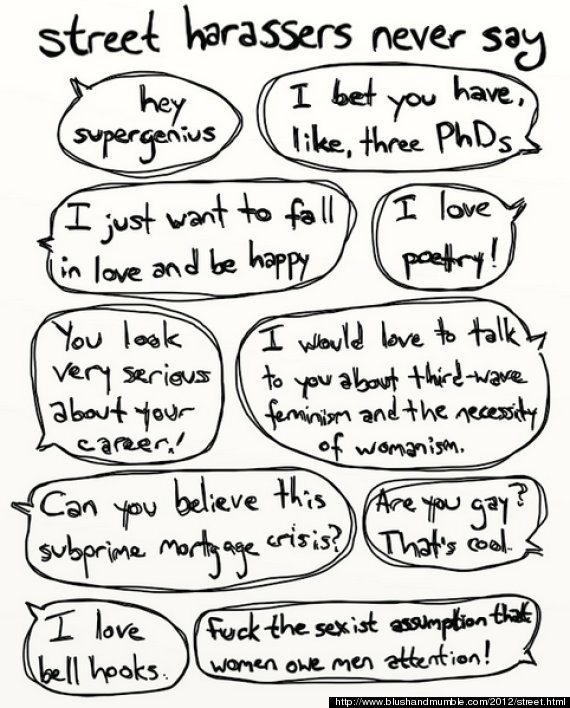By Lauren McEwen, Washington, D.C., USA, SSH Correspondent
In my months as a Stop Street Harassment correspondent, I’ve focused heavily on different ways I respond street harassment (harassment from elderly men and intra-racial street harassment, et cetera), but today, in my final, official post as a blog correspondent, I want to focus on a time when I failed to shout back loud enough. A time that I continue to look back on, disappointed at my own inability to thoroughly stand up for myself.
First, let me begin by saying that there is no “correct” way to respond to street harassment. I think we should always try to respond in a manner that 1) keeps us safe and 2) keeps our dignity and self-esteem intact, but there will always be those moments in which we, personally, feel that we could have done a better job. Those moments that we mull over long afterward, cursing ourselves for not saying the right thing, or failing to report the harassment to the proper authorities. This is probably one of the most damaging effects of street harassment – the guilt, shame and helplessness it can make us feel.
For example, once a teenage boy threw a full bottle of water at my back because I refused to stop and give him my phone number. It did not matter that I am an adult who wouldn’t have been interested even if he were of age, or that I was on the phone with my mother when he decided to loudly describe what he thought of my breasts in my top. I’d rejected him in front of his friends, so he threw the bottle at me. I doubled over from the force of the hit, and he and his friends ran from the corner, laughing.
I almost called the police, but stopped short because I hadn’t seen the boy’s face, and I knew that if the police helped at all, they would most likely round up every black boy within a five-block radius and frisk them. Of course, he got away with assault, and my back ached for days, but I wasn’t complicit in having innocent boys treated like criminals. I could live with that…after a while.
But I still cannot fully forgive myself for how I responded to being groped while leaving the train station in June. I was headed to the grocery store to pick up a few things for my then-boyfriend’s birthday. It was boiling out, so I was wearing a thin, cotton dress. I’m not describing what I was wearing because of internalized acceptance of rape culture, or anything like that. It’s important to understand how little actual clothing I was wearing to understand how violated I felt.
As I’m scrolling through the shopping list on my phone, I suddenly feel something press against my backside. It takes me about seven, sickening seconds before I fully realize what it is: an erect penis. I whip around, and come to face-to-face with a stranger: a middle-aged man wearing a white button down and khakis and carrying a leather briefcase.
For a millisecond, I consider that he may have been standing so close to me because the escalator was crowded, but that hope quickly crumbles when I realize that not only is the escalator nowhere near full, but that he had to lean forward in order to press against my behind.
I’m shocked and disgusted and furious, and I start cursing and shouting at him to get away from me – to never touch me. And that is when he did something that infuriated me even more than the groping: he shook his head and walked away, trying to signal to anyone within earshot that I was mentally unstable, and not worth listening to. The other people on the escalator began looking uncomfortable, and moved quickly aside as I stormed up the remaining steps, shaking, afraid that he would follow me.
No matter how many times I tell myself that I did respond, albeit not as effectively as I would have liked (that I was alone and things could have easily escalated if I’d continued to press the issue, that I reacted in the moment and cannot blame myself for being startled) I still wish I’d reported it to the transit police, at least, if not to teach him a lesson, then to prevent him from doing it to someone else.
By the time I made it to the grocery store, I could barely focus on getting my shopping done, taking an hour longer than necessary to gather everything I needed. Eventually, I called my boyfriend to pick me up, and he spent the car ride home feeling guilty for not driving me in the first place.
But I shouldn’t need a male escort to shepherd me around in order to avoid being groped by strangers. Not only is it demeaning, but it’s also impractical, and that kind of thinking places the weight of preventing street harassment back on its victims.
I write all of this to say, no matter how long you have been speaking up about street harassment, how many other people you have helped fight back against it, how many articles you’ve shared or retweeted – none of us are immune to that feeling of helplessness. None of us react the “right” way…at least, not each and every time.
And even though I am still trying to force myself to believe this, I’m saying it now…those moments do not make you weak. They do not make you coward. They make you a person who was too shocked or hurt or disgusted by another human being’s behavior to follow whatever anti-street harassment protocol you had planned. I just hope there isn’t a next time, and if there is, I want to place the shame back on my harasser, not carry it with me for months afterward.
Lauren is a recent graduate of Howard University where she majored in print journalism with a minor in photography. You can check out more of her work at laurenmcewen.weebly.com and follow her on Twitter at @angrywritergirl.




